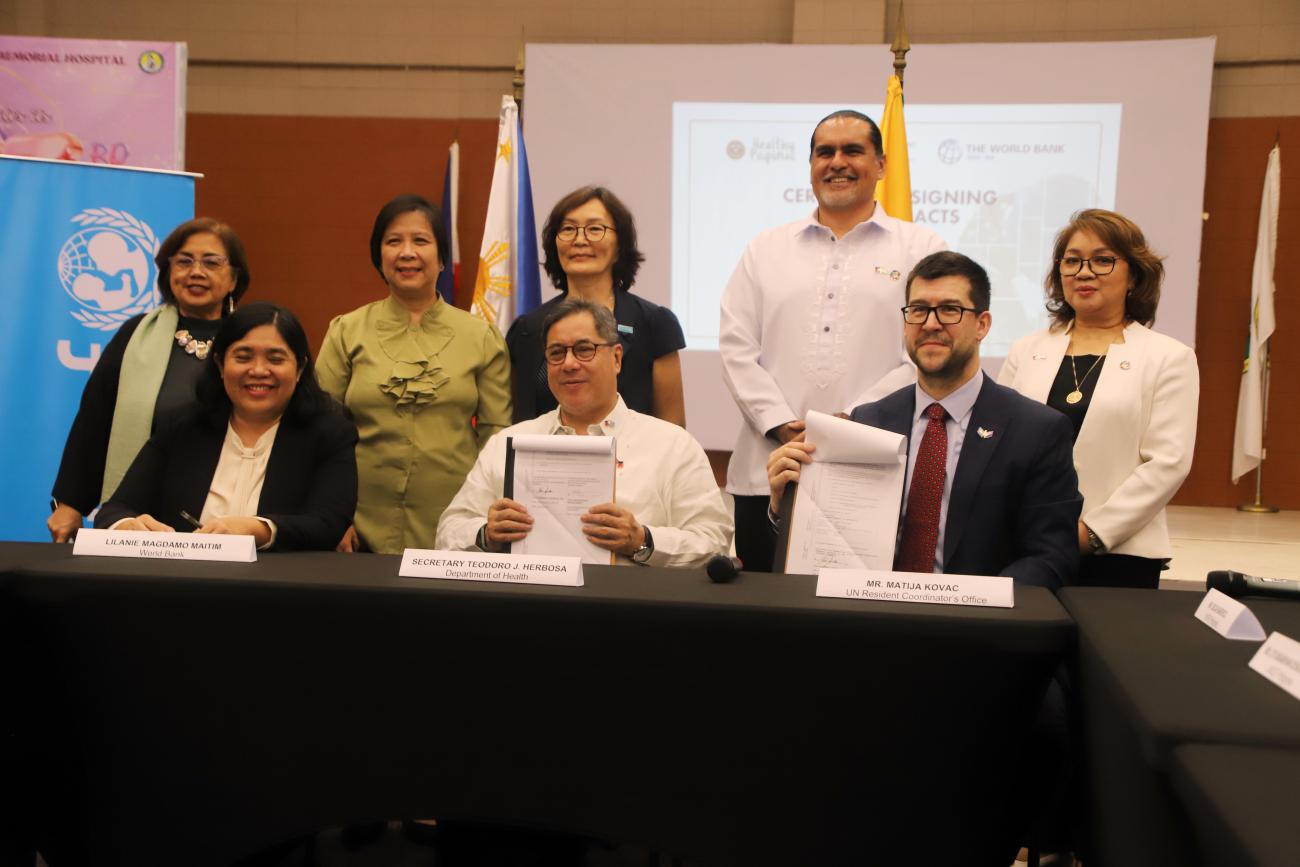13 November 2023
The Department of Health (DOH), along with United Nations (UN) agency partners, UNICEF and the United Nations Office for Project Services (UNOPS), and World Bank inked a memorandum of understanding formalizing the partnership in addressing malnutrition in the Philippines.
As part of the broader Philippine Multisectoral Nutrition Project (PMNP), a four-year project spearheaded by the DOH and co-led by the Department of Social Welfare and Development (DSWD), this agreement adopts a bold multi-sectoral approach to achieve nutrition-specific and nutrition-sensitive interventions across 235 local government units (LGUs) in Luzon, Visayas, and Mindanao, as well as 40 municipalities in the Bangsamoro Autonomous Region of Muslim Mindanao (BARMM).
This project aims to increase the utilization of a package of nutrition-specific and nutrition-sensitive interventions and improve key behaviors and practices known to reduce stunting. It also enhances the capacity of the DOH and will support the delivery of nutrition and health care services at the primary care and community levels in municipalities known to have a high incidence of poverty and malnutrition.
"Improving the nutritional status of children is crucial for achieving the country's goals of enhancing human capital, strengthening economic recovery, and fostering long-term growth," said Ndiame Diop, World Bank Country Director for Brunei, Malaysia, Philippines, and Thailand.
The partnerships formalized today with UNICEF and UNOPS, as implementing partners, aim to strengthen primary health care and nutrition service delivery. This will be achieved through the provision of healthcare equipment and supplies, basic primary care and nutrition commodities, multisectoral information systems development for localized decision-making, capacity building for frontline healthcare workers, community health navigation, and health and nutrition leadership and governance for local chief executives. Additionally, the partnerships will focus on social behavior change and communication (SBCC), verification of LGU performance and finance systems for the performance-based grants, as well as project measurement and evaluation.
“Good nutrition is a fundamental child’s right. The need for healthy diets, multisectoral services, and practices that protect, promote, and support good nutrition has never been greater. By strengthening national and local systems and improving access to essential services in communities, we can help children not only survive but thrive. UNICEF is committed to supporting efforts to end child stunting, ensuring that every child has the opportunity to grow and develop to their full potential," said UNICEF Philippines Representative Oyunsaikhan Dendevnorov.
This is also in association with the community-driven development approach of DSWD Kapit-bisig Laban sa Kahirapan Comprehensive and Integrated Delivery of Social Services (KALAHI-CIDSS), where to date implementing communities have initiated more than 3,000 procurement packages using the community-based procurement system, with over 600 contracts successfully fulfilled. All these efforts are dedicated to improving access to and utilization of clean water, proper sanitation, enhanced hygiene practices (WASH), and access to Early Childhood Care and Development (ECCD) services.
"When children have better nutrition, they learn better. They can create opportunities to gradually break the cycles of poverty and hunger. By working together in the Philippine Multisectoral Nutrition Project, UNOPS and its partners will reach those furthest behind and help achieve the SDGs”, said UNOPS Philippines Country Manager, Oscar Marenco.
The partnership between the DOH and the UN will enhance the DOH's access to global expertise and resources, thereby expanding its knowledge base and network. Leveraging the UN's global portfolio of programs and initiatives, the DOH will gain a wealth of information and best practices, enabling it to enhance and optimize its public health programs and services.
“The PMNP is a recognition that nutrition is not just a matter of health. The Marcos Administration sets this intervention as part of its foundation for social and economic development by ensuring women and children’s access to the first 1,000 days of services as a critical investment in our country’s human capital. This collaboration between the DOH and the UN is a testament to our shared commitment to building a healthier and better future for the Filipino people, especially women and children," said DOH Secretary Teodoro Herbosa.
--------------------
Media Contacts
Mario Villamor, (mariovi@unops.org)
Marge Francia, (mfrancia@unicef.org)







